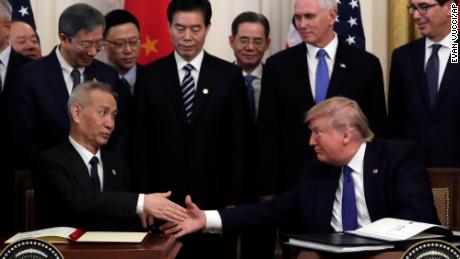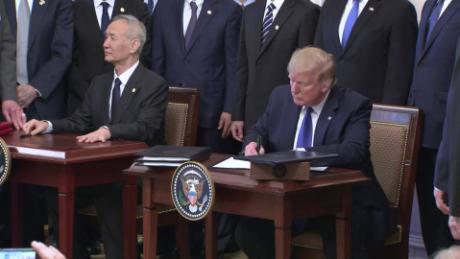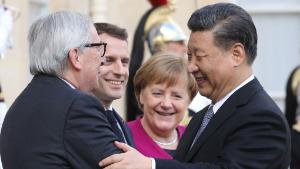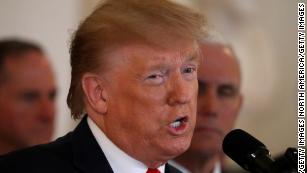China is a massive headache for Europe Luke McGee
Europe has a China problem.
Late last week, news broke that three people were being investigated by German prosecutors on suspicion of involvement in Chinese espionage. German diplomatic sources confirmed to CNN that one of those involved is thought to be a former European Union diplomat, who served several of the bloc's institutions over a number of years.
The specter of someone who worked at the heart of the European Union's establishment could be compromised by malign Chinese actors should be a nasty wake-up call for officials in Brussels, who are currently rushing to sign a long-awaited investment agreement with Beijing.
For Europe, China is an attractive economic prospect. Already the EU's second largest external trading partner, it's a massive economy with serious spending power and the potential for lucrative investment returns. The problem is, China's political system makes it a risky place to put money.
Donald Trump is currently a bigger headache for Europe than Iran is
For China, the interest in Europe is both economic and strategic. The EU is not only China's largest trading partner, but also a place where Chinese investors see huge potential. The problem here is that Chinese firms wanting to invest in Europe are often seen as a security risk, meaning they have to jump through hoops that rivals do not.
The spying allegations are another sign that Beijing plays by a different set of rules, experts said, but one that Europe may have to overlook. Why? Because Chinese investment is an essential part of Europe's attempt to position itself bang in the middle of the US and China in their battle for global supremacy.
"The truth is the shape of the world as we face it now means that trading partners will spy on each other. The EU may want a close economic partnership with China, but this is unlikely to stop Chinese espionage," said Raffaello Pantucci, a China expert at the Royal United Services Institute, currently based in Singapore.
And while there is frustration in Europe with Beijing's alleged spying activities, there is simply too much at stake for a diplomatic blowout. "It is neither in the economic interest of the EU and China nor in their diplomatic style to let differences escalate to levels allowed by the White House," said Steven Blockmans, head of foreign policy at the Centre for European Policy Studies.
The Chinese embassies in Berlin, Brussels and London didn't immediately respond to CNN's request for comment about the spying claims.
A balancing act
Right now, a storm is brewing over whether Chinese telecoms giant Huawei should be allowed to build 5G infrastructure in Europe. Although Huawei is a private company, it has close links to the Chinese government.
The UK is expected to make up its mind later this month, while the EU is expected to make a decision in the coming months. However, that decision is likely to be advice for member states to take into account, rather than a blanket decision, either way.
The Trump administration has long argued that Huawei poses a national security risk, and that Beijing could use the company's products to spy on other nations -- allegations the company has fiercely denied. President Trump's administration has waged legal battles against the company, cracking down on its ability to operate in the United States, and has repeatedly put pressure on both the EU and individual European nations to follow its lead.
Only last week, a US delegation traveled to London to lobby British officials not to use the firm. US officials have heavily hinted that not falling in line would have wider implications for a post-Brexit trade deal, a major priority for the Brits.

The trade war with China is far from over
It's here where things get messy for Europe, especially the EU. Currently, Europe's chief foreign policy objective is to avoid being squashed between the two major poles in global power at a time when observers say the continent is being treated by both China and the US as part of a wider strategy to undermine the other.
Add to that the fact that the UK is about to break free from the EU where it will be free to pursue its own foreign policy, and Brussels is suddenly in a tight spot.
"The EU is China's largest trading partner ... But China's interest in Europe is also motivated by geopolitical competition with the United States," said Lucrezia Poggetti, Research Analyst at the Mercator Institute for China Studies in Berlin. "European countries are part of the transatlantic alliance, and China is interested in weakening Western unity to pursue its goals."
Thus, the Huawei row is a perfect storm. In the race for global supremacy, it's much more than a hard-nosed economic decision for Europe. The choices that European nations make will send a global message as to where they believe the world is heading.
"5G is going to be the next major step forward for the world, and whoever builds the infrastructure is likely to be able to control it," said RUSI's Pantucci.
"The way the narrative is being framed by Beijing and Washington is that you have two poles of the world competing for this control: the Chinese or the Americans. Seen from Washington, if you choose the Chinese infrastructure then you've picked the Chinese world."
Despite Huawei's protests and denials, the security risks associated with allowing it to build infrastructure are not unfounded. Jonathan Sullivan, Director of the China Policy Institute, said that while it's unlikely the Chinese would directly abuse data in a way that affects consumers, "the bigger concern is at the strategic and security level, and the potential for an adversary to have enormous leverage in a conflict scenario."

U.S., China sign agreement following trade war
While a Huawei network might work very well on a day-to-day basis, Pantucci said, the fear is that in a confrontation with China, "a computer gets turned on and all the data gets transferred to Shanghai -- or someone is able to get in and shut off a power system." That's just the system itself. Once built, it will need to be maintained, which Pantucci says could see Chinese staff being sent over to work in Europe: "Some of them could very well be doing their jobs. But others could be doing something else."
'Systemic rival'
Given the possibility that a former diplomat in Brussels might have been compromised by China, why would European capitals still be considering allowing Huawei a hand in the future of the continent's internet?
On paper, the choice facing European nations is simple: are billions of dollars in investment worth a hypothetical security risk in a hypothetical standoff with China? And regardless of whether China builds these networks or not, will it make much difference to alleged Chinese spying on the continent?
Brussels officials are somewhat blase about the latter. Referring to the espionage investigation, one EU source said: "Clearly, this revelation is jaw-dropping. But I'm sure that Brussels in general is full of intelligence operatives. It's the home of NATO and all the main EU institutions."
A world trade war is brewing. The US-China deal won't stop it
Even in the EU's officially declared policy on China, published in March of last year, it accepts that in some policy areas it's a "systemic rival" and that engagement with China "requires a flexible and pragmatic whole-of-EU approach enabling a principled defense of interests and values." EU staffers say this declaration was a robust response designed to shock China into taking the EU more seriously.
However, a difficult reality for the EU, its member states and especially the UK to swallow is that currently, they are all seen by the two rival global powers as being geopolitically up for grabs.
And as Europe enters the post-Brexit phase and fights to remain globally relevant, it will increasingly have to make some tough choices. Chief among those is how it engages with China and the US, should its current policy of trying to balance relations with the two become untenable.
Does it stick with its old friend, the US, which is increasingly using its economic might to strong-arm allies into line? Or does it inch toward China, a nation that represents the antithesis of Western democracy and could pose a real security risk?
The tragedy for Europe is that despite its best intentions, even a minor step in either direction can only be taken with confidence if there is a level of pan-European agreement. And if the last few years have taught us anything, there is very little that Europe's disparate population is united on right now.
News Courtesy: www.cnn.com












